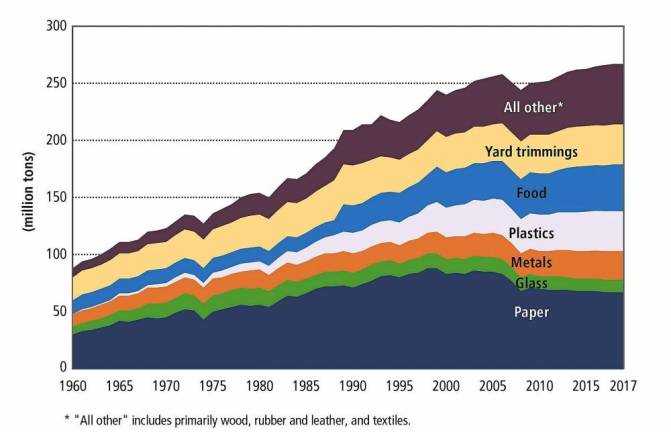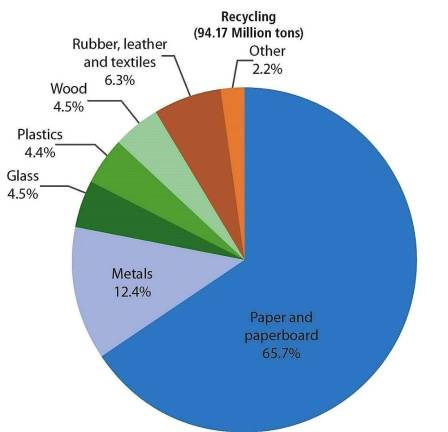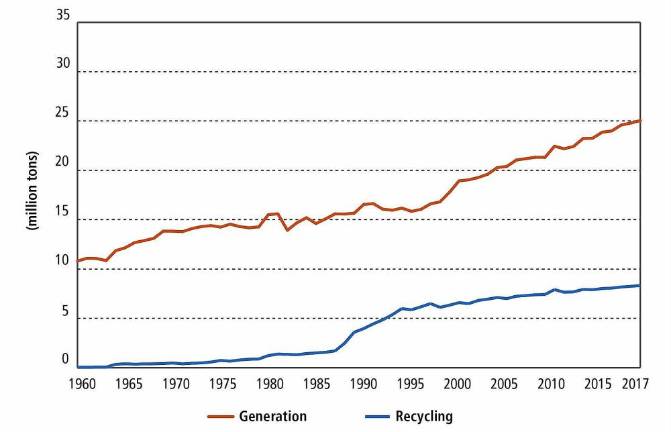You do the math: The local cost of recycling
West Milford. Township Recycling and Solid Waste Coordinator David Stires appeals to residents to recycle their metal items as the new recycling procedures have many residents scratching their heads about what is – and what isn’t – recyclable.



West Milford Recycling and Solid Waste Coordinator David Stires has a question for township residents.
“Why do we want to pay $80 a ton to get rid of something we’re getting $165 a ton to recycle?” he said. “That’s big. From paying to getting paid.”
The “something” Stires is referring to is metal, which is one of the few categories of recycling the township still gets paid for.
“A curtain rod, a hair dryer, a hair curler – anything with a cord – is recyclable at the recycling center,” he said. “You don’t even have to bring it there. All you have to do is call and we’ll put you on the list (to pick it up).”
Currently, Stires said residents are throwing out a large number of perfectly recyclable metal items.
“I was out with the garbage men teaching them the route, and every day I loaded up my truck three times with metal from one route,” he said. “That’s a lot of money.”
Just how much money are we talking?
“Last year we made $91,000 off of it,” Stires said. “People are throwing their metal in the garbage because (the recycling center) is only open a couple days.”
As of Jan. 1, the West Milford Recycling Center is open to residents on Wednesdays and Saturdays, from 8 a.m. to 4 p.m., and on Sundays from 10 a.m. to 3 p.m.
According to Stires, the recent reduction in hours has been less than helpful.
“It’s just not good,” he said. “People are upset about it closing, it was very convenient for a lot of people.”
At the Dec. 4, 2019 Township Council meeting, Acting Administrator Bob Casey said changes to recycling were in the works.
“The recycling center should not be open to residents with curbside collection,” Casey said at that time. “We want the residents to put out everything for curbside collection. We want the trucks (picking up) full.”
In the push for curbside pickup, however, Stires said township officials have forgotten all the ways residents use the recycling center.
“The mayor and council want us to have the residents use curbside because they consider the recycling center double dipping,” he said. “The only problem is the recycling center’s not just for that. People bring their leaves, their grass, their oil, their tires, their electronics, their metal.”
The reduction in hours at the center was intended to reduce the cost of a full time employee and benefits, which Casey estimated at $65,000.
Despite multiple attempts, Casey could not be reached for comment and Mayor Michele Dale referred questions to the council, citing the governing body as the budget side of the township’s form of government.
Council President Ada Erik said she has heard concerns from multiple residents since the reduction in hours, and will be discussing them at the next Beautification and Recycling Committee meeting on Feb. 11.
Erik serves as the council liaison for recycling.
“At the end of the day, we’re under 9,000 tons of garbage,” Stires said. “By next year, if we’re going this way, we’re going to be back up to 10,000 tons and maybe more.”
New year, new procedures
With the calendar change this year, came new recycling procedures that have many residents scratching their heads about what is – and what isn’t – recyclable.
According to the recycling center’s Facebook page, all paper and cardboard must be kept dry and stored in a covered container or covered with a tarp. Any paper or cardboard that is wet is considered non-recyclable and will not be picked up.
Stires said this is because of the mechanical process of recycling.
“All of our recyclables go through a machine,” he said. “If your newspapers and papers are soaking wet, it sticks on the teeth of the machine and just clogs it up.”
Even more menacing than wet paper products, Stires said, are plastic bags, and, once the machine shuts down because of a clog, everybody working it is just standing around.
“When you’re talking downtime, you’re not talking just the machine,” Stires said. “You’re talking the machine and 60 guys.”
Considered recyclable in some municipalities and not in others, pizza boxes are no longer recyclable in West Milford, according to the center, and must be disposed of with garbage.
The reason for the change is twofold, Stires said.
“When we compact (pizza boxes), that actually turns combustible,” he said. “Besides that the grease is contaminated, it can actually catch fire when they squish it together with a compacter.”
In a unique solution to the disposal problem, Stires said that people looking to get rid of their pizza boxes in other states simply hang them up and use them for target practice. Some pizza vendors will even print targets onto their boxes so bow and gun users can make good use of them, he said.
On collection days, pickup times are now earlier than previously because the township’s new recycling contractor has extra trucks collecting. Recycling must now be to the curb by 6 a.m. on collection days, the center said.
Of the items collected, only plastic containers with #1, #2 and #5 symbols will be collected, and scrap metal will now be picked up on a call-in basis.
“We went to #1, #2 and #5 because that’s what our recycling facility wants and can market,” Stires said. “Three’s, 4’s, 6’s and 7’s are still recyclable – at a very high cost. $80 a ton, actually. That’s why they don’t want them. They’re still charging us a contamination fee because they know people are going to put the other things in too.”
In a post on the recycling center’s Facebook page, Newfoundland resident Bobby Castro wanted to know how the numbered plastics differed.
“What do the numbers on the plastic mean?” Castro said. “Isn’t plastic just plastic anymore?”
Not quite, according to Stires.
“(It’s) the difference in the composition in plastic, different ingredients,” he said. “A #7 plastic – that’s the last end use of it. So mostly #7’s, if you squish it, it’ll crack in your hands and shatter all over the place. It can’t be recycled anymore.”
In another post to the Facebook page, John Barrere, of Newfoundland, seemed to think the changes were counterintuitive.
“Perfect!” Barrere said. “Make it harder to recycle so more can wind up in the landfills.”
Brian Foster echoed Barrere’s concern.
“Who the hell looks at #1, #2 and #5,” Foster said. “Jeez. I recycle but you're making this confusing. Most people will just say screw it and put it in the garbage.”
Identifying himself as West Milford’s recycling coordinator from 1994-1999, Skip Decker said in a post that the changes to recycling are ultimately the town’s own fault.
“We did this to ourselves,” Decker said. “We did not keep the recycling clean. Since most of our recycling goes to China, they dictate what they will take. It’s not just happening in NJ, this is nationwide.”
China puts the brakes on U.S. recycling imports
In July 2017, China put the World Trade Organization on notice that it intended to ban the import of 24 categories of recyclable materials beginning Jan. 1, 2018.
The recycling industry’s largest consumer, China also said it would be imposing tighter quality standards on all scrap imports beginning March 1, 2018.
“Ever since China stopped taking our stuff, we have nowhere to bring it,” Stires said. “Nobody wants to process it because processing it is so expensive that everything’s at a minus. We were getting paid for it when it was going to China.”
In other words, the days of $200,000 profits to the town from recycling are gone.
“We’ll be lucky if it doesn’t cost us $80,000 this year to recycle,” Stires said. “There’s garbage and recycling companies that are piling stuff up on their properties because there’s nowhere to bring it.”
According to the Northeast Recycling Council’s report on blended commodity values, the average commodity value per ton from July to September 2019 was $34.85. That figure would be nearly $7 more without non-recyclable or otherwise undesirable materials being thrown into the mix.
From April to June 2019, the change in average commodity value per ton was -32 percent, according to the council.
The average processing cost for recycling commodities for July to September 2019 was $83 per ton, which is nearly identical to the average processing cost for calendar year 2018, which was $82 per ton.
The Northeast Recycling Council supports recycling market development in its 11-state region, which includes New Jersey, New York, Pennsylvania, Delaware, Connecticut, Massachusetts, New Hampshire, Rhode Island, Vermont, Maine and Maryland.
The local cost of recycling
If there is a bright side locally, Stires said it can be found in the township’s dual stream system of recycling.
“Thank God we did not go to single stream,” he said. “Some towns are paying $90-120 a ton to get rid of their recyclables and we’re nowhere near that. We separate, so that saves us.”
Not that Stires is feeling terribly optimistic about the recycling market in general.
“This thing is not going to get better for a very long time,” he said. “It’s going to stay bad, we’ve just got to try to weather it.”
According to Stires, the paper and cardboard market was always where the money was at, but not so much anymore.
“At one point we were getting $140-150 a ton for paper and cardboard,” he said.
Compare that to the $30 a ton Stires predicts the township will be paying in the next six months, just to get rid of it.
The glass market is currently at $-32 a ton, Stires said, and #3, #4, #6 and #7 plastics are sitting somewhere around -$78 a ton. But the market changes from month to month, and nothing remains constant.
“It’s very volatile,” he said. “You’re talking $180-210 a ton for cereal boxes down to -$20. That’s how bad it got.”
Looking to the future of the overall recycling market, Stires said he sees a long road ahead.
“I think it will come back, but nowhere near where it was,” he said. “I think for the next five years we’re going to be struggling.”